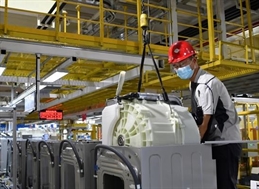
Supply chain disruptions, geopolitical tensions that led to supply shortages and logistic bottlenecks as well as the impact of the COVID-19 pandemic continues to raise doubts about the sustainability of the manufacturer's supply chain.
PwC Hong Kong's Asia Pacific, Mainland China, and Hong Kong Consumer Markets Leader Michael Cheng said that manufacturers should look beyond their short-term strategies and prepare for market changes in their medium to long-term strategies to future-proof their operations and anticipate new trends, as well as to ensure quick and successful responses to such uncertain environments.
This comes as manufacturers have been agitatedly reworking their business models to mitigate supply chain disruption through vertical integration.
The PwC Hong Kong's Asia Pacific, Mainland China, and Hong Kong Consumer Markets Leader said Hong Kong manufacturers have seen a structural shift in the city's economy over the past decades from manufacturing to service, trade, and other high-value-added activities.
"The COVID-19 resurgence in Hong Kong during the first quarter of 2022 led to a new wave of disruption that challenged our status quo regarding the core drivers of demand: price, quality, and convenience," Cheng said. "Many manufacturers went into self-preservation mode. They began simplifying their supply chains, streamlining their product lines and cutting down on non-core services."
More uncertainties have also emerged in recent months, according to Cheng. At a global scale — geopolitical tensions, inflationary pressure, supply chain issues, climate change, and above all, fear of global recession.
Covid-19 impact; gloomy prospects
On the other hand, many manufacturers have yet to fully resume their production capacity and re-engage with their customers.
Cheng explained that as an export-oriented economy, Hong Kong is faced with challenges from the appreciating US dollar, land shortage and lack of talent in middle and high managerial levels of manufacturing — casting a "shadow" over the short-term market prospect for manufacturers.
"To ensure quick and successful responses to changing market environments, manufacturers must look beyond their short-term strategies and prepare for market changes in their medium- to long-term strategies to future-proof their operations and anticipate new trends," the PwC Hong Kong executive added.
For many manufacturers, Cheng said the current market uncertainty has also raised doubts about the resilience and sustainability of their supply chain setups. He said the latest pandemic and geopolitical tensions led to supply shortages and a logistics bottleneck.
"Supply chain disruptions continue to impact the sourcing of raw materials and transportation of finished goods to customers. Manufacturers have been reworking their business models to mitigate supply chain disruption through vertical integration," Cheng added.
"In order to achieve a well-integrated supply chain, manufacturers should ensure, from an upstream perspective, secure key inputs and more sustainably sourced materials for production and on the downstream, control how products are distributed with increased transparency."



